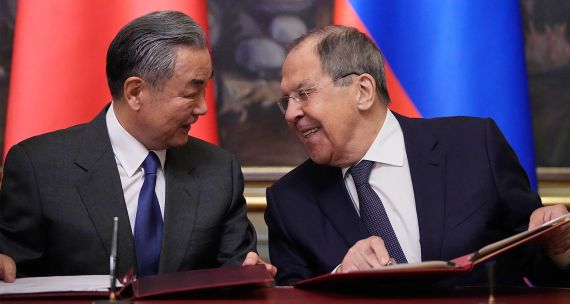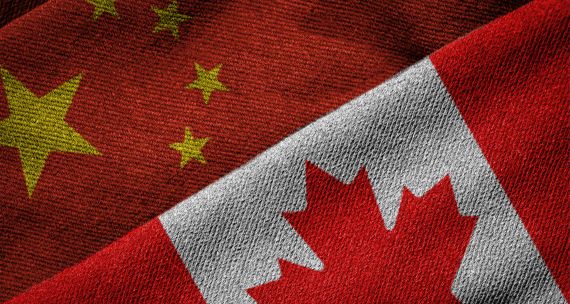Last week, the Canadian government rejected the $1.5-billion, Beijing-backed takeover of Canadian construction company Aecon, with Economic Development Minister Navdeep Bains citing national security concerns. There were also compelling economic reasons.
China's interests were not helped when, in April, China's ambassador to Canada, Lu Shaye, said opposing the sale to the state-owned China Communications Construction Co. (CCCC) was "immoral."
Critics now expect retaliation from Beijing, but retaliatory threats will not advance China's interest in Canada. Only respect for each other will lead to understanding and a working relationship satisfactory to both countries. 'One party, one mindset' may work for China; diverse parties and diverse mindsets are Canada's strengths.
It would be helpful to have Lu explain what he meant by "immoral" so Canadians might better understand him. Would he be so kind as to comment on whether Canadians were immoral when, in 1970, alongside France, we showed leadership among democratic nations in establishing relations with then-isolated China? Or during the many years when the bulk of our foreign aid was directed to China? Or when we extended citizenship to the many Hong Kong residents who were apprehensive of what might happen to them after the 1997 handover of Hong Kong to communist China? Or as we continue to welcome mainland Chinese immigrants to Canada and help them settle here?
These are examples of Canadian actions. They are consistent with our values, which, combined with the space and resources we are blessed to have, underpin what Canada is all about. No wonder we continue to attract immigrants and help them settle here, as we should, including of course immigrants from China, so many of whom end up being patriotic Canadians as they become increasingly more at ease in their new homeland.
I know it. I am one of the millions who immigrated and who is now a proud Canadian.
Was Lu telling us that unless we act in accordance with the dictates of the Communist Party of China we will be deemed "immoral," as he urged Canada to "adjust its mindset," presumably to suit Communist Party of China?
The party not only controls the government, but also directs that every business — that would include China's Canadian businesses — must have a representative within its governing bodies, to ensure that the directives from the Party are implemented.
It follows, then, that Canadians working for Chinese state-controlled companies in Canada would have allegiance to a foreign government ahead of their own. But is that not the surest way of losing one's sovereignty and putting at risk Canada's prosperity?
In an April 23 opinion piece supporting the Aecon deal, Michael Wilson, the former Progressive Conservative finance minister, and Brian Tobin, the former Conservative minister of fisheries and industry and former premier of Newfoundland and Labrador, said: "We both see significant net benefits from the deal. Put another way, if either of us thought this was bad for Canada, we would not be on board."
Were Wilson and Tobin suggesting that it would benefit Canada for Aecon, as a China state-owned company, to have access to an increased amount of capital? The Canadian government allowing Aecon, a Canadian construction-sector leading company, to become a foreign company with access to more capital than its Canadian competitors have would be substantially detrimental, not beneficial, to Canada. That is the surest way of weakening domestic companies.
As a foreign company, Aecon would be in an advantageous position to bid on public sector construction projects financed by the Canadian taxpayers, to the detriment of its Canadian competitors, resulting in Canadian taxpayers supporting a foreign government. No wonder Aecon's competitors opposed the sale.
Moreover, the sale would put at risk Aecon's Canadian employees, as it is China's policy to import labour on the pretence of language skills and favour China-sourced services, materials and equipment. Aecon profits would accrue to a foreign government, instead of benefitting Canadians.
Considering these disadvantages, our government had no alternative but to block the sale. The leader of the opposition, Conservative Andrew Scheer, found a very diplomatic way of letting the Canadian government know how his party felt: he declined invitations to meet Lu.
The fact that the World Bank debarred CCCC and its subsidiaries for eight years for fraudulent practices in the Philippines might be the reason that Aecon withdrew from being considered for the construction of the Gordie Howe International Bridge, an important joint Canada-United States project slated for the Windor-Detroit passage. Aecon's management may have anticipated that if it became a Chinese-state company, it would be disqualified. So, a Canadian company lost a valuable opportunity because of misjudgement.
Malaysia also has insights to offer. The return to power of Malaysian Prime Minister Mahathir Mohamad on May 11 was partly due to his campaigning against Chinese government influence that has led to the loss of key national assets. As Mahathir observed, those welcoming Chinese state monies see the immediate benefits to some but fail to recognize the consequences.
Sri Lanka is another good example of what can go wrong. It welcomed Chinese funding to build a port, but when Sri Lanka ran into repayment difficulties, China acquired the port.
Back in Canada, other business deals are now in question. We should be asking if, for instance, the Anbang Insurance Group — which holds significant commercial properties in Canada, including Toronto's HSBC building, Vancouver's Bentall Centre and the Western Canadian Retirement Concepts senior care company — was used to acquire assets in Canada which a China state-owned company should not have qualified to buy?
China jailed Anbang's founder for fraud earlier this month and then seized the company's assets, including those in Canada. The transfer of those assets to a new foreign owner will have to be approved by our government. If transferred to a state-owned company, neither do our businesses wish to be Chinese government tenants, nor do our taxpayers look forward to subsidizing a service owned by a foreign government. Would Canadians tolerate the transferring of wardship of our seniors to a foreign government?
With regards to the recent article in favour of the deal, it is worth nothing that Wilson is chairman of Barclays Capital Canada, the financial advisor to CCCC. And Tobin is both the chairman of the Aecon board of directors and the vice-chair of BMO Capital Markets, an economic advisor to Aecon.
When, a long time ago, a former federal Liberal minister of Indian and Northern Affairs, the late Arthur Laing, was offered a directorship elsewhere after leaving parliament, Laing said his knowledge of government workings and his extensive government contacts were acquired while Canadian taxpayers paid him. Those skills, Laing said, were not for sale; they belonged to Canada. How times have changed.
The evidence against allowing further Chinese investment continues to mount. The United States, Germany and France are increasingly protective of their core national assets. Let's not be less cautious.
When, in the 1970s, Canada was at risk of losing its major businesses and natural resource companies to US private investors, the government of then-Prime Minister Pierre Trudeau created the Foreign Investment Review Agency. Shouldn't today we be more cautious when China's government poses that same danger?
This piece first appeared on OpenCanada.org on May 28, 2018.



